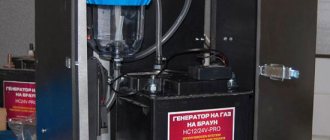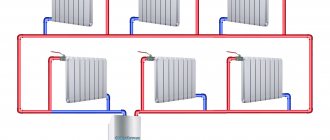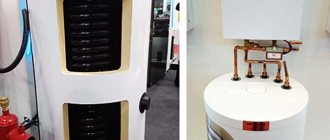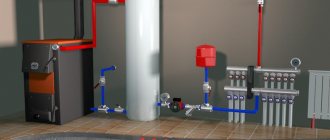In order for the autonomous heating system to operate stably and uninterruptedly, it is necessary to take care in advance of purchasing special devices for it. In this case we are talking about a generator. It guarantees that households will not be left without heat, even if their electricity is cut off for a long time. And this problem is not so rare, especially for people who prefer to live in the countryside.
Types of generators for heating boilers and their features
How to choose the right generator for a heating boiler? In fact, choosing the perfect option is not that difficult. Of course, a wide selection can confuse even the buyer who knows exactly what he came to the store for. But he has a goal to buy just one high-quality generator that will be useful for his heating system. To quickly cope with this task, you need to understand what type of device the buyer is interested in, and what features of the product he should pay attention to.
Prospects for hydrogen as a fuel for a heating boiler
- Hydrogen is the most abundant “fuel” in the Universe and the tenth most abundant chemical element on Earth. Simply put, you will not have problems with fuel reserves.
- This gas cannot harm people, animals, or plants - it is not toxic.
- The “exhaust” of a hydrogen boiler is absolutely harmless - the combustion product of this gas is ordinary water.
- The combustion temperature of hydrogen reaches 6000 degrees Celsius, which indicates the high heat capacity of this type of fuel.
- Hydrogen is 14 times lighter than air, that is, in the event of a leak, the “emission” of fuel will evaporate from the boiler room on its own, and in a very short time.
- The cost of one kilogram of hydrogen is 2-7 US dollars. In this case, the density of hydrogen gas is 0.008987 kg/m3.
- The calorific value of a cubic meter of hydrogen is 13,000 kJ. The energy intensity of natural gas is three times higher, but the cost of hydrogen as a fuel is tens of times lower. As a result, alternative heating of a private home with hydrogen will cost no more than using natural gas. At the same time, the owner of a hydrogen boiler does not need to pay the appetites of the owners of gas companies and build an expensive gas pipeline, as well as go through an extremely bureaucratic procedure for approving all sorts of “projects” and “permits.”
In short, as a fuel, hydrogen has the most promising prospects, which have already been appreciated by the aerospace industry, which uses hydrogen to “refuel” rockets.
Modern development - hydrogen heating boiler
How does a hydrogen heating boiler work?
Exactly the same as a regular gas boiler:
- Fuel is supplied to the burner.
- The burner torch heats the heat exchanger.
- The coolant poured into the heat exchanger is transported to the batteries.
Only instead of a main gas pipeline or tanks with liquefied fuel, special installations - hydrogen generators - must be used to produce fuel.
Moreover, the most common type of household generator is an electrolytic unit that splits water into hydrogen and oxygen. The cost of fuel produced by electric generators for heating with hydrogen reaches 6-7 dollars per kilogram. At the same time, to produce a cubic meter of combustible gas, water and 1.2 kW of electricity are required.
But in this case you can save on the removal of combustion products. After all, during the combustion of a mixture of oxygen and air, only water vapor is released. So such a boiler does not need a “real” chimney.
Pros of hydrogen boilers
- Hydrogen can be used to “heat” any boilers . That is, absolutely any - even old “Soviet” units purchased in the 80s of the last century. To do this, you will need a new burner and granite or fireclay stone in the firebox, which increases thermal inertia and levels out the effect of boiler overheating.
- Hydrogen boilers have increased thermal output . A standard 10-12 kW hydrogen gas boiler will produce up to 30-40 kilowatts of thermal power.
- For heating with hydrogen, by and large, you only need a burner . Therefore, even a solid fuel boiler can be converted “for hydrogen” by installing the burner in the firebox.
- The base for obtaining fuel - water - can be extracted from a water tap . Although the ideal semi-finished product for hydrogen production is distilled water, into which sodium hydroxide is added.
Disadvantages of hydrogen boilers
- A small range of industrial-type hydrogen boilers and gas generators. Most sellers offer “homemade products” with dubious certification.
- High price of industrial models.
- The explosive “nature” of the fuel is that when mixed with oxygen (in a ratio of 2:5), hydrogen turns into an explosive gas.
- High noise level of gas generating plants.
- High flame temperature - up to 3200 degrees Celsius, making it difficult to use hydrogen as fuel for a kitchen stove (special dividers are needed). However, H2ydroGEM - a hydrogen heating boiler made in Italy by Giacomini - is equipped with a burner with a flame temperature of up to 300 degrees Celsius.
Types of modern generators
Modern generators for dependent boilers and other heating systems primarily differ from each other in the type of fuel on which they operate. Therefore, they distinguish:
- Gasoline generators. They are suitable for ensuring smooth operation of dependent heating. These devices are attractively inexpensive. It has small dimensions. But this does not in any way prevent the generator from providing enormous power to operate the boiler.
- Gas generators. They are powered by a gas mixer. And the engine is often used the same as for gasoline devices.
- Diesel generators. They are suitable for use in high-power installations. It makes no sense to take them for a small heating boiler, since they are specially designed for large-sized systems that operate on an ongoing basis.
When choosing a generator for a boiler, it is recommended that you first pay attention to the fuel that powers it.
It’s good if both units operate from the same substance. Then the owner of the house will not have to spend money on buying another type of fuel. Generator sets also differ in their operation. They can operate on a synchronous or asynchronous circuit. The question often arises: to choose a synchronous or inverter generator. To find the answer, you need to understand the features of each type.
The operation of a gas boiler from a synchronous generator has its own differences. The rotor of the device has an excitation winding through which current flows. Electricity regulates the strength of its magnetization. This generator is easy to use. The voltage in it is easily adjusted. The most common problem that arises with synchronous units is the rapid wear of the commutator rings. They solve it by installing new elements.
Generators for wall-mounted and other asynchronous gas boilers are equipped with a magnetized stator. Due to this, they receive less stability of the output voltage. If there are frequent and sudden load surges, then it develops a long-term drawdown. Therefore, it is not wise to use such a unit with a gas boiler and a circulation pump at the same time.
On sale today you can see an inverter generator for heating. It is good because it does not make unnecessary noise during operation. If it is subjected to a small load, then fuel consumption will be minimal. For such a unit, the buyer will have to overpay a lot, since modern models of generators of this type are not cheap. In addition, when working with it, some problems may arise that can damage the entire heating system.
Hydrogen generators: features
The maximum power of a hydrogen generator is 6. However, the optimal burner power is calculated based on the area of the living space. In addition, a mandatory condition for the operation of such equipment is a constant supply of electrical energy.
Hydrogen burners are used for heating homes and industrial facilities, both as independent heating systems and to complement existing heat sources. It is important to ensure that such equipment operates normally at low temperatures. Most often, to heat a house, such units are connected to “warm floor” systems.
Operating principle of a hydrogen generator
The device generates heat using the process of electrolysis of water in the presence of a special catalyst. At the same time, normal and safe operation of the generator is possible only if, as a result of such an electrochemical process, the reaction of hydrogen and oxygen does not occur, because their combination is explosive. Therefore, modern devices of this type produce another substance – Brown’s gas. It is also called water gas.
This substance is greenish or brown in color and is absolutely non-explosive.
The resulting gas is heated to forty degrees Celsius and then enters the heat exchanger, which is essentially a combustion chamber. And there it is mixed with the air-fuel element. Next we will talk about the design of a hydrogen generator for heating.
The main elements of such heating devices are a boiler and various tubes. In principle, no additional technical accessories are required for normal operation.
The same applies to equipment for removing combustion products. This is due to the fact that as a result of this process, only water vapor is formed, which is absolutely safe for humans due to its purity.
To make such units more efficient, their design is often made modular: special catalysts are placed in each part. If we talk about the tubes used, then it is advisable to use those whose diameter is in the range of 1-2.5 inches.
This parameter may, of course, differ slightly, but for maximum efficiency it is still better to use tubes with the above values.
When installing heating pipes, do not forget that each previous branch is made larger in diameter than the next one.
Generator for a private home
The buyer decides independently which generator to buy for heating a residential building. But still, he should take a closer look at gas and fuel models operating on a synchronous circuit. They are more reliable, so they can cope with heavy loads.
Finally, it wouldn’t hurt to get acquainted with another common type of unit, which allows the boiler to receive backup power from a generator. These are models that work due to the flow of electricity into them. We need to warn you right away. It is highly not recommended to connect other household appliances to the network while using such a generator. This can lead to system overload, which will negatively affect the performance of the entire heating system. Electrical units are appropriate to use in dachas, where the risk of overload due to an overabundance of switched on devices is minimal.
Electric generators are divided into two types:
- Built on the basis of a classical scheme. They produce sawtooth voltage.
- Inverter units. They have double conversion and allow you to obtain a sine-type voltage waveform.
Principle of operation
Under the influence of an electric charge, water breaks down into hydrogen and oxygen. Then, when hydrogen and oxygen molecules interact, a reaction occurs, as a result of which the so-called Brown gas is formed and the process of heat release occurs. The heat, in turn, will heat the water and ensure a normal temperature in the room.
Elements of a heating system using hydrogen
Structure of hydrogen boilers:
- An electrolyser is a special hydrogen generator for home heating that produces a reaction between oxygen and hydrogen.
- A heating burner that creates a flame.
- A boiler that acts as a heat exchanger.
Electrolysis process to produce hydrogen
For successful operation of a hydrogen plant, it is important to observe the following:
- Possibility of water supply, most often it is water from the tap.
- Fluid consumption parameters directly depend on the power of the device.
- Provide access to the electricity needed to carry out the electrolysis reaction.
- Replace the catalyst in accordance with a certain frequency, which depends on the modification and power of the boiler.
It is important to note that a hydrogen boiler created industrially is characterized by a high level of safety. This unit is safer in operation than gas and solid fuel boilers.
Gas and fuel generators
If a boiler that runs on fuel or gas needs to be grounded, then you should choose a generator for it that has this property.
Online generators are ideal for autonomous power supply to gas-fired boilers. They are continuously connected to the power source, due to which the required voltage is always supplied to them. The boiler itself receives its own phase and neutral, which are very important for units with a combustion sensor. Online devices produce a pure sine wave. Such models reliably protect equipment connected to the network. They have the ability to stabilize the voltage supplied to the unit.
Connecting the generator to the boiler
Connecting the gas boiler to the generator must follow the instructions exactly. If the owner of the house noticed that his heating device does not function after installing the auxiliary unit he just purchased, then, most likely, mistakes were made when connecting them. This is the most common cause of this problem.
To connect a generator to a gas boiler, it is not necessary to call a specialist. An ordinary person who has never had to do anything like this before can easily cope with such work. He will only need to carefully study the instructions for carrying out this procedure. According to the standard, the employee must strictly adhere to the following scheme:
- Initially, you should find the necessary contacts in the automatic boiler system. They need to be found on the generator. This stage passes very quickly. To see the corresponding contacts, just look at the electrical diagram located in the instructions for the device.
- Now you need to carefully connect the selected wires together. They must be isolated. A special tape is used for this purpose. This work is very delicate. Upon completion there should not be any wires sticking out. If this rule is not followed, a short circuit may occur at any time, which will lead to complete or partial burnout of the main parts of the unit.
- The device itself must be grounded by any available method.
- The entire procedure for connecting the generator to a gas boiler does not take much time. In addition, it does not require any specific knowledge. You just need to act strictly according to the instructions supplied with the device.
A gas boiler, which is equipped with a generator, will work in any situation. It will stop functioning only if the gas supply to the house is cut off. Installing a universal heating system will help you insure yourself against this problem. It is used only in emergency cases.











